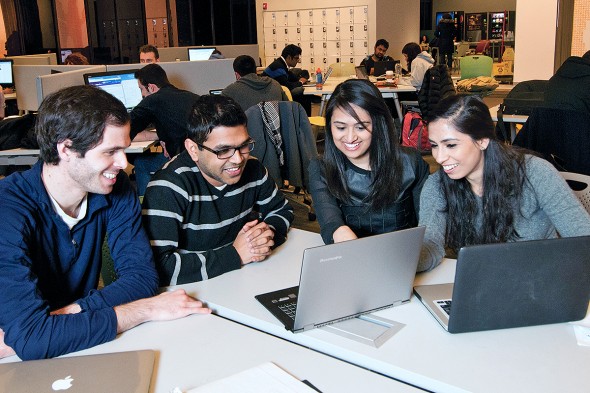UIC team vies for $1M prize to help change the world

Competing in Hult Prize contest, L-R: Drew Nannini, Rahul Patel, Evana Robbani and Shefali Batra. Photo: Joshua Clark/UIC Photo Services
Three students and a recent grad are one step closer to $1 million in start-up funding as they head to San Francisco this weekend to compete in the regional finals of the fifth annual Hult Prize, co-sponsored by the Clinton Global Initiative and the Hult Prize Foundation.
The UIC group was chosen for the social entrepreneurship competition from more than 10,000 applications received from over 350 colleges and universities in over 150 countries.
This year’s edition of the Hult Prize is based on a challenge personally selected by former President Bill Clinton. It calls on participants to address chronic illnesses and non-communicable diseases affecting 250 million people living in urban slums around the world.
The UIC team — from the Honors College, School of Public Health and the colleges of Pharmacy and Liberal Arts and Sciences — is developing a social health care business focused on patient education for obesity, diabetes, cardiovascular disease, cardiorespiratory disease and mental illness.
“Our project will give health care providers direct interaction with the patients in a controlled environment and on a regular basis,” said Shefali Batra, UIC team captain and 2013 biological sciences graduate.
“Patients will be on a specified schedule and our services will be available to them at locations convenient to their home and work.”
Batra and team members Drew Nannini, a graduate student in epidemiology, Rahul Patel, an Honors College senior majoring in biological sciences, and Evana Robbani, doctoral student in pharmacy, hope their social business idea will be a tool for the targeted populations to better understand the impact of their health issues and the necessary solutions.
“We believe that choosing between medical services and food or a day off from work should not be a decision anyone has to make,” Batra said.
“Our model for solving this year’s social enterprise challenge aims to bring systematic change to more areas of Chicago, developed nations and underdeveloped nations.”
The Hult Prize regional competitions, held Friday and Saturday in Boston, San Francisco, London, Dubai, Shanghai and Sao Paulo, require teams to pitch their social business idea before an audience of company presidents and chief executive officers, physicians and academics.
The UIC team will compete in San Francisco against 50 teams from across the world and nation, such as Stanford, University of California-Berkeley, University of California-Los Angeles and the University of Pennsylvania, in addition to local rivals Loyola and Northwestern.
In advance of the regional, the team is formalizing a business plan and project prototype. They are administering a survey and conducting interviews with health care providers and experts in technology, government funding and U.S. Food and Drug Administration approval.
After the regional finals, one winning team from each host city will move into a summer business incubator, where participants will receive mentoring, advice and strategic planning as they create prototypes and set up to launch their new social business.
A final round of competition will be hosted by the Clinton Global Initiative at its annual meeting in September, where delegates will select a winning team to receive the $1 million prize from Clinton.
“We are giving entrepreneurs from around the world a platform to innovate and revolutionize the way we think about servicing the poor,” Ahmad Ashkar, CEO and founder of the Hult Prize, said in a statement.
The annual competition is the “world’s largest student completion and crowd-sourcing platform for social good,” according to the Hult Prize Foundation, a nonprofit organization dedicated to launching the world’s next wave of social entrepreneurs.
